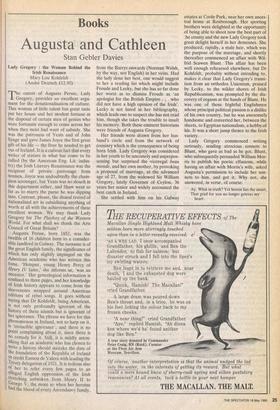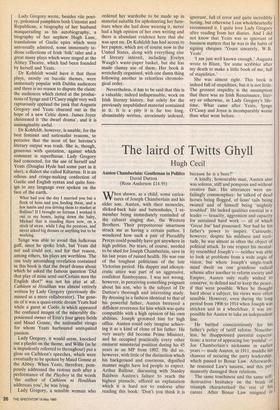Books
Augusta and Cathleen
Stan Gebler Davies
Lady Gregory : the Woman Behind the Irish Renaissance Mary Lou Kohfeldt (Andre Deutsch £12.95) The career of Augusta Persse, Lady Gregory, provides an excellent argu- ment for the denationalisation of culture. This woman of little talent but great taste put her house and her modest fortune at the disposal of certain men of genius who were fortunate enough to come across her when they most had want of subsidy. She was the patroness of Yeats and of John Synge and gave James Joyce the first great gift of his life — the fiver he needed to get out of Ireland. It is a curious fact that every writer of stature in what has come to be called (by the American Eng. Lit. indus- try) the Irish Literary Renaissance was the recipient of private patronage from women. Joyce was undoubtedly the cham- pion scrounger, but Yeats was no slouch in this department either, and Shaw went so far as to marry the purse he was dipping into. Contrast, please, the dismal record of nationalised art in subsidising anything of worth at all with the achievements of these excellent women. We may thank Lady Gregory for The Playboy of the Western World. For what shall we thank the Arts Council of Great Britain?
Augusta Persse, born 1852, was the twelfth of 16 children born to a consider- able landlord in Galway. The surname is of the great English family, the significance of which has only slightly impinged on the American academic who has written this tome. 'Hotspur, young Henry Percy of Henry IV fame,' she informs us, 'was an ancestor.' Her genealogical information is confined to three pages, and her knowledge of Irish history appears to come from the sleevenotes wrapped around American editions of rebel songs. It goes without saying that Dr Kohfeldt, being American, is not only profoundly ignorant of the history of these islands but is ignorant of her ignorance. The phrase we have for this phenomenon in Ireland, not to harp on it, is 'invincible ignorance', and there is no Point complaining about it, since there is no remedy for it. Still, it is mildly aston- ishing that an academic who has chosen to write a history should mistake the date of the foundation of the Republic of Ireland or credit Eamon de Valera with leading the Treaty delegation of 1921. It is tedious also of her to refer every few pages to an alleged English oppression of the Irish stretching unbroken from Henry II to George V, the more so when her heroine had the blood of every Ascendancy family,
from the Barrys onwards (Norman Welsh, by the way, not English) in her veins. Had the lady done her best, one would suggest to her a reading list which might include Froude and Lecky, but she has so far done her worst as to dismiss Froude as 'an apologist for the British Empire . . who did not have a high opinion of the Irish'. Lecky is not listed in her bibliography, which leads one to suspect she has not read him, though she takes the trouble to insult his memory. Both these eminent historians were friends of Augusta Gregory.
Her friends were drawn from her hus- band's circle and from the network of cousinry which is the consequence of being born Irish. Lady Gregory was considered in her youth to be uncomely and unprepos- sessing but surprised the viceregal beau monde, and her own mother, by provoking a proposal of marriage, at the advanced age of 27, from the widowed Sir William Gregory, lately Governor of Ceylon, 36 years her senior and widely accounted the best catch in Ireland.
She settled with him on his Galway estates at Coole Park, near her own ances- tral home at Roxborough. Her sporting brothers were delighted at the opportunity of being able to shoot now the best part of :he county and the new Lady Gregory took great delight herself in her demesnes. She produced, rapidly, a male heir, which was the purpose of the marriage, and shortly thereafter commenced an affair with Wil- frid Scawen Blunt. This affair has been well enough rehearsed elsewhere, but Dr Kohfeldt, probably without intending to, makes it clear that Lady Gregory's transi- tion from an orthodox Unionism, praised by Lecky, to the wilder shores of Irish Republicanism, was prompted by the dis- covery of orgasm at the hands of Blunt. He was one of those frightful Englishmen whose principal political passion is a dislike of his own country, but he was awesomely handsome and converted her, between the sheets, to Egyptian nationalism, a hobby.of his. It was a short jump thence to the Irish variety.
Lady Gregory commenced writing seriously, sending atrocious sonnets to Blunt, who gave as bad as he got. Blunt, who subsequently persuaded William Mor- ris to publish his poetic effusions, while having an affair with Morris's wife, asked Augusta's permission to include her son- nets to him, and got it. Why not, she answered, in verse, of course.
Ay. What in truth? Yet herein lies the smart, That grief for you no longer grieves my heart.
Lady Gregory wrote, besides vile poet- ry, polemical pamphlets both Unionist and Republican, a biography of her husband masquerading as his autobiography, a biography of her nephew Hugh Lane, translations of Gaelic epics which were universally admired, some immensely te- dious collections of Irish 'folk' tales and a great many plays which were staged at the Abbey Theatre, which had been founded by herself and Yeats.
Dr Kohfeldt would have it that these plays, mostly on bucolic themes, were immensely popular with Dublin audiences and there is no reason to dispute the claim: the audiences which rioted at the produc- tions of Synge and O'Casey might very well rapturously applaud the junk that Augusta Gregory and Yeats churned out in the hope of a new Celtic dawn. James Joyce christened it 'the dwarf drama', and it is unimaginably awful.
Dr Kohfeldt, however, is unable, for the best feminist and nationalist reasons, to perceive that the most of her heroine's literary output was trash. She is, though, generous with quotation, against which comment is superfluous. Lady Gregory had concocted, for the use of herself and Yeats (Douglas Hyde had some part in it also), a dialect she called Kiltartan. It is an odious and cringe-making confection of Gaelic and English syntax and quite fore- ign to any language ever spoken on the face of the earth.
What had you the day I married you but a flock of hens and you feeding them, and a few lambs and you driving them to market at Ballina? If I brought no fortune I worked it out in my bones, laying down the baby, Michael that is standing there now, on a stock of straw, while I dug the potatoes, and never asked big dresses or anything but to be working.
Synge was able to avoid this ludicrous guff, since he spoke Irish, but Yeats did not and could not, and for that reason, among others, his plays are worthless. The one truly astonishing revelation contained in this book is that the dwarf drama about which he asked the famous question 'Did that play of mine send out/Certain men the English shot?' Was not his play at all.
Cathleen ni Houlihan was almost entirely written by Lady Gregory (previously dis- missed as a Mere collaborator). The gene- sis of it was a quasi-erotic dream Yeats had while a guest at Coole, in which appeared the confused images of the miserably dis- posiessed owner of Erin's four green fields and Maud Gonne, the nationalist virago for whom Yeats harboured unrequited passion.
Lady Gregory, it would seem, knocked out a playlet on the theme, and Willie (as he is impudently referred to throughout) put a gloss on Cathleen's speeches, which were eventually to be spoken by Maud Gonne at the Abbey. When Yeats, therefore, pom- pously addressed the riotous mob after a performance of the Playboy in the words 'the author of Cathleen ni Houlihan addresses you', he was lying.
Lady Gregory, a sensible woman who ordered her wardrobe to be made up in material suitable for upholstering her furn- iture when she had done wearing it, never had a high opinion of her own writing and there is abundant evidence here that she was spot on. Dr Kohfeldt has had access to her papers, which are of course now in the United States, along with everything else of literary interest, including Evelyn Waugh's waste-paper basket, but she has made clumsy use of them. Her book is wretchedly organised, with one damn thing following another in relentless chronolo- gical order.
Nevertheless, it has to be said that this is a valuable, indeed indispensable, work on Irish literary history, but solely for the previously unpublished material contained in it. It is a pity it is far too long, abominably written, atrociously indexed, ignorant, full of error and quite incredibly boring, but otherwise I can wholeheartedly recommend it. I quite love Lady Gregory after reading from her diaries. And I did not know that Yeats was so ignorant of business matters that he was in the habit of signing cheques 'Yours sincerely, W.B. Yeats'.
'I am just well known enough,' Augusta wrote to Blunt, 'for some scribbler after my death to make a little book of me, full of stupidities.'
She was almost right. This book is indeed full of stupidities, but it is not little. The grossest stupidity is the assumption that there was an Irish Renaissance, liter- ary or otherwise, in Lady Gregory's life- time. What came after Yeats, Synge O'Casey and Joyce is incomparably worse than what went before.















































 Previous page
Previous page